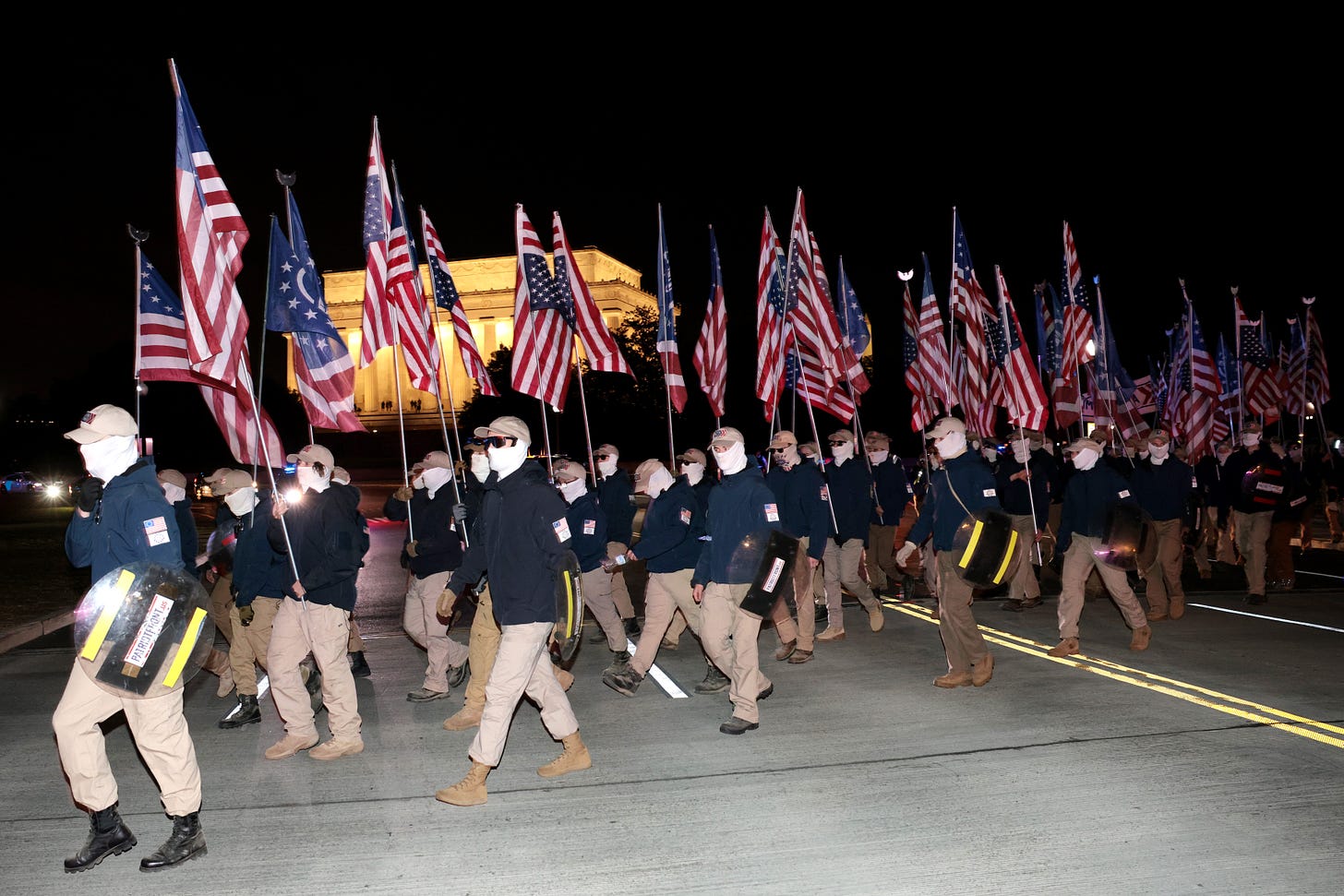
Members of the rightwing group Patriot Front gather for an unannounced rally at the National Mall on December 04, 2021 in Washington, DC. Patriot Front broke off of the white nationalist group Vanguard America after the deadly “Unite the Right” rally in Charlottesville, Virginia in 2017. (Photo by Win McNamee/Getty Images)
Let’s start by putting this national disgrace in context.
Three-quarters of Black Americans are worried that they or someone they love will be attacked because of their race, according to a nationwide Washington Post-Ipsos poll conducted after a gunman killed 10 people at a Buffalo supermarket, allegedly targeting members of the mostly Black neighborhood.
The Post-Ipsos poll of Black Americans finds most are saddened and angered by the attacks, but just 8 percent say they are “surprised.” Even before the shooting, in earlier poll questioning, Black people saw racism as one of their greatest threats. After the attack, only 10 percent think the problem of racism will improve in their lifetimes, while a 53 percent majority think it will get worse.
And the response? The new CBS/YouGov poll finds that 48 percent of Republican voters say that it is “not very/not at all” important for political leaders to condemn white nationalism and white supremacy.
Meanwhile, in the wake of the Buffalo massacre by a white nationalist terrorist the Senate GOP is vowing to kill a modest domestic anti-terrorism bill.
I wrote about the GOP’s flip-flop on terrorism in my latest column over at MSNBC:
[The] response from the GOP is a reflection of just how rapidly the political ground has shifted. A previous version of the same bill was passed by the House in an unanimous voice vote in September 2020. This time, though, House GOP leaders shrugged off the urgency of the threat and told members to vote "no.”
Republican leaders went so far as to conflate the Buffalo killings with other episodes of the culture wars. House Minority Whip Steve Scalise, R-La., complained that the Justice Department had “targeted and labeled rightfully concerned parents as domestic terrorists for speaking out at school board meetings.” (The Washington Post’s Fact Checker has awarded that claim Four Pinocchios.)
After years of insisting that Obama and Democrats had to use the term “radical Islamic terrorism,” few if any GOP leaders now even acknowledge the problem of “white supremacist terrorism” or “antisemitic extremism.”
The party of law and order has gone noticeably soft on terrorism — or at least this kind of terrorism.
This selective outrage did not go unnoticed, even among some Trump supporters. The Ohio pastor Darrell Scott, who was one of Trump’s earliest evangelical Christian supporters in 2016, was appalled enough by the GOP’s muted sympathy for the victims of the Buffalo shooting to tweet about it. The leaders of the right “expressed more sympathy for Kyle Rittenhouse,” he argued.
In the Senate, Republicans are pledging to kill even the modest anti-terror measure. The party that once lined up behind a targeted ban on millions now takes umbrage at the notion of even monitoring the activities of American extremists and writing reports about them. “It sounds terrible,” said Sen. Josh Hawley of Missouri, likening the bill to “the Patriot Act for American citizens.” (Republicans had, of course, also overwhelmingly supported the original Patriot Act, which was passed in the wake of the 9/11 attacks.)
But the real tell was the defensive reaction from Republicans like Sen. Ron Johnson of Wisconsin. “The Democrats can’t even wait an hour before they blame the Republicans for the Buffalo shooting. I think it’s despicable,” Johnson complained.
Johnson protests too much.
His reaction suggests a guilty conscience. Taking an aggressive position on white nationalist violence might ensnare some of Johnson’s allies — or maybe even hold the right accountable for its own extremist rhetoric.
This flip-flop should have political consequences.
The Trumpified GOP may brush off allegations of racism, but its new squishiness on terrorism undermines a key pillar of its electoral strength, and — unless the Democrats are politically brain-dead — its about-face should be a potent wedge issue this year.
You can read the whole thing here.